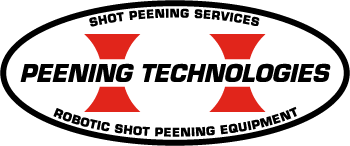Nondestructive Testing
Magnetic Particle Testing (MPI)
What is Magnetic Particle Inspection?
Magnetic Particle Inspection (MPI) is a non-destructive testing process for detecting flaws in the surface and subsurface of ferromagnetic materials such as Iron, Nickel, Cobalt, and other alloys. This process creates a magnetic field in the component, which enables the inspector to see discontinuities on the surface and slightly below the surface of the material being inspected.
What are the advantages of Magnetic Particle Inspection?
Magnetic particle is great for the detection of surface flaws such as cracks, laminations, and welding defects like porosity. Unlike liquid penetrant, Magnetic Particle Inspection also has the ability to detect discontinuities below the surface of the material. MPI is also portable, and easily managed for onsite inspections.
Peening Technologies MPI capabilities
Peening Technologies of GA has the capability for all methods of Magnetic Particle testing. At Peening Technologies we currently have two Magnetic Particle benches; a 6,000 amp and 10,000 amp unit used for MPI. We also have the capability for onsite inspections with our 4,000 amp mobile unit with the capability for clamps and cable wrap, and we utilize yokes for a more portable inspection. We offer onsite inspections to the customer’s location, so part size is never a problem. Our NDT program is Nadcap approved, and we also have many approvals from customers in the aerospace and power generation industries.
Room size: 1,800 sq. ft
6,000 amp bench:
Bench size – 6’ X 3’
Contacts – 7” X 7”
Coil size - 20” diameter
FWDC & AC capability
MPI Methods: Wet, Dry, Circular, Longitudinal, cable wrap, clamps, yoke
Type: Fluorescent (Type I), Visible (Type II)
10,000 amp bench:
Bench size – 6’ X 3’
Contacts – 12” X 12”
Coil size - 25” diameter
FWDC capability
MPI Methods: Wet, Dry, Circular, Longitudinal, cable wrap, clamps, yoke
Type: Fluorescent (Type I), Visible (Type II)
How do you perform Magnetic Particle Inspection?
Magnetic Particle inspection can be performed using the wet or dry methods. The part surface is pre-cleaned to remove any dirt, oil, grease, paint or scale that could prevent particle mobility or cause false indications. Cleaning methods can include solvents such as acetone, alcohol or alkaline cleaning. The part is then electrically charged to create a magnetic field. During the creation of the magnetic field, ferrous Iron particles are applied to the part in either dry or wet suspension. The particles will be attracted to any discontinuities on the part and build up around the leakage field to form an indication. The indication will then be evaluated by our expert NDT inspectors to determine the characteristics and severity of the defect. Based on the results of the evaluation, the NDT inspector will provide a report describing the type, size, and number of discontinuities found.
Peening Technologies Qualified MPI Inspectors
Our qualified NDT inspectors are highly trained in all methods of Magnetic Particle Inspection, and have many years of experience in the aerospace, power generation, and manufacturing industries. Our inspectors are fully qualified, hold certifications from ASNT, and meet the requirements of SNT-TC-1A and NAS-410.
